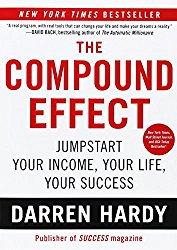For the SmallIvy Book Club we’re reading The Compound Effect

The Compound Effect
One thing Hardy stresses in his book is that there are little choices (good and bad) that don’t seem to mean anything when we make them, but cause things to end up as they do in two, five, ten years or more. I know this is definitely the case for gaining financial independence. When my wife and I started “acting abnormal,” as Dave Ramsey would say (because normal people are broke), it definitely was a lonely journey with a lot of doubt. All around us people were buying new cars every few years, going on expensive trips, and eating out almost constantly. They were also buying big homes with big mortgages. (This one particularly worried me since the leverage they were getting would mean they’d make a lot more on their expensive home than I would on my modest home if housing prices continued to rise as they had for a long time, but the housing crunch made me glad we had made the choice we did.) Few of them were putting much money away for retirement or college savings accounts for their children, let alone investing money outside of their retirement accounts.
Meanwhile we were buying used cars with 80,000 miles on them for a few thousand dollars (and paying cash), eating most meals in, bringing lunches, and going on driving vacations where we’d stay and 2 star hotels. We bought a modest home for which we put 20% down. After a few years we refinanced from a 30-year to a 15-year loan and then paid that off in about 12 years. It really didn’t seem like we were getting anywhere for a long time.
But then we were able to pay off our home early. The stock market, after sitting idle for about 14 years between 1998 and 2012, finally started to pick up steam and cause our retirement accounts and taxable accounts to climb in value. (Actually, there were times of great gains in those periods, but there were also two huge financial crises – the 1999 dot com bust and the 2008 housing crunch – that erased a lot of the gains that we had made. During that time, however, we were building up our stock holdings, which meant that when the markets finally did really take off, we were ready to take advantage.) Once things started happening and the compound effect took hold, it seemed like everything changed fast.
Shop Amazon Gift Cards. Any Occasion. No Expiration.
Shop Amazon – Hot New Releases – Updated Every Hour
Shop Amazon Warehouse Deals – Deep Discounts on Open-box and Used Sports Equipment
We reached financial independence about four years ago. This means that we could stop working and make enough from our investments to live on. At that time it would have been a fairly meager living, but really not too bad. In the last few years we’ve almost gotten to the point where we could fully replace salaries from investments – as I said, things happen fast. This means I’m 45 and could probably just quit working if desired, which I don’t, but it does allow me the flexibility to care about what work I do).
Hopefully some others out there are reading The Compound Effect with me so that we can all discuss it at the end of May. I hadn’t planned on discussing it before I had finished the book, but couldn’t help myself. I hope others are enjoying the book as well and finding things they can use in their lives.
Follow me on Twitter to get news about new articles and find out what I’m investing in. @SmallIvy_SI
Disclaimer: This blog is not meant to give financial planning or tax advice. It gives general information on investment strategy, picking stocks, and generally managing money to build wealth. It is not a solicitation to buy or sell stocks or any security. Financial planning advice should be sought from a certified financial planner, which the author is not. Tax advice should be sought from a CPA. All investments involve risk and the reader as urged to consider risks carefully and seek the advice of experts if needed before investing.
